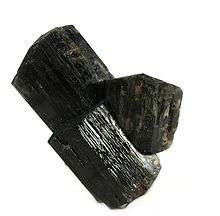Richterite
| Richterite | |
|---|---|
 Richterite. Wilberforce, Monmouth Township, Haliburton County, Ontario, Canada. | |
| General | |
| Category | Inosilicates |
| Formula (repeating unit) | Na(NaCa)Mg5Si8O22(OH)2 |
| Strunz classification | 9.DE.20 |
| Crystal system | Monoclinic |
| Crystal class |
Prismatic (2/m) (same H-M symbol) |
| Space group | C2/m |
| Identification | |
| Color | Brown, yellow, red, or green |
| Crystal habit | Prismatic; acicular or asbestiform |
| Twinning | Simple or multiple parallel to {100} |
| Cleavage | Perfect |
| Fracture | Uneven, brittle |
| Mohs scale hardness | 5-6 |
| Luster | Vitreous |
| Streak | Pale yellow |
| Diaphaneity | Transparent to translucent |
| Specific gravity | 3.0-3.5 |
| Optical properties | Biaxial (-) |
| Refractive index | nα = 1.615 nβ = 1.629 nγ = 1.636 |
| Birefringence | δ = 0.021 |
| Pleochroism | Strong: pale yellow, orange, and red |
| 2V angle | 68° measured |
| References | [1][2][3][4] |
Richterite is a sodium calcium magnesium silicate mineral belonging to the amphibole group. If iron replaces the magnesium within the structure of the mineral, it is called ferrorichterite; if fluorine replaces the hydroxyl, it is called fluororichterite. Richterite crystals are long and prismatic, or prismatic to fibrous aggregate, or rock-bound crystals. Colors of richterite range from brown, grayish-brown, yellow, brownish- to rose-red, or pale to dark green. Richterite occurs in thermally metamorphosed limestones in contact metamorphic zones. It also occurs as a hydrothermal product in mafic igneous rocks, and in manganese-rich ore deposits. Localities include Mont-Saint-Hilaire, Quebec, and Wilberforce and Tory Hill, Ontario, Canada; Långban and Pajsberg, Sweden; West Kimberley, Western Australia; Sanka, Myanmar; and, in the US, at Iron Hill, Colorado; Leucite Hills, Wyoming; and Libby, Montana. The mineral was named in 1865 for the German mineralogist Hieronymous Theodor Richter (1824–1898).
References
- Bonewitz, 2008, Smithsonian Rock and Gem